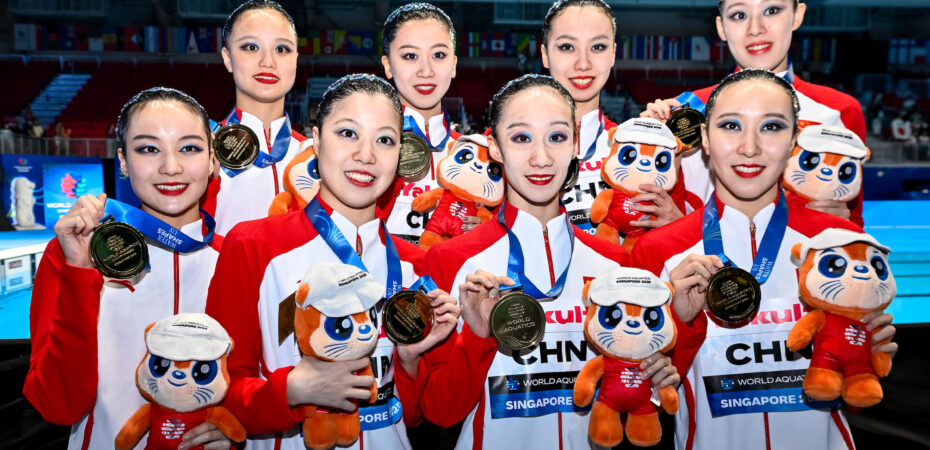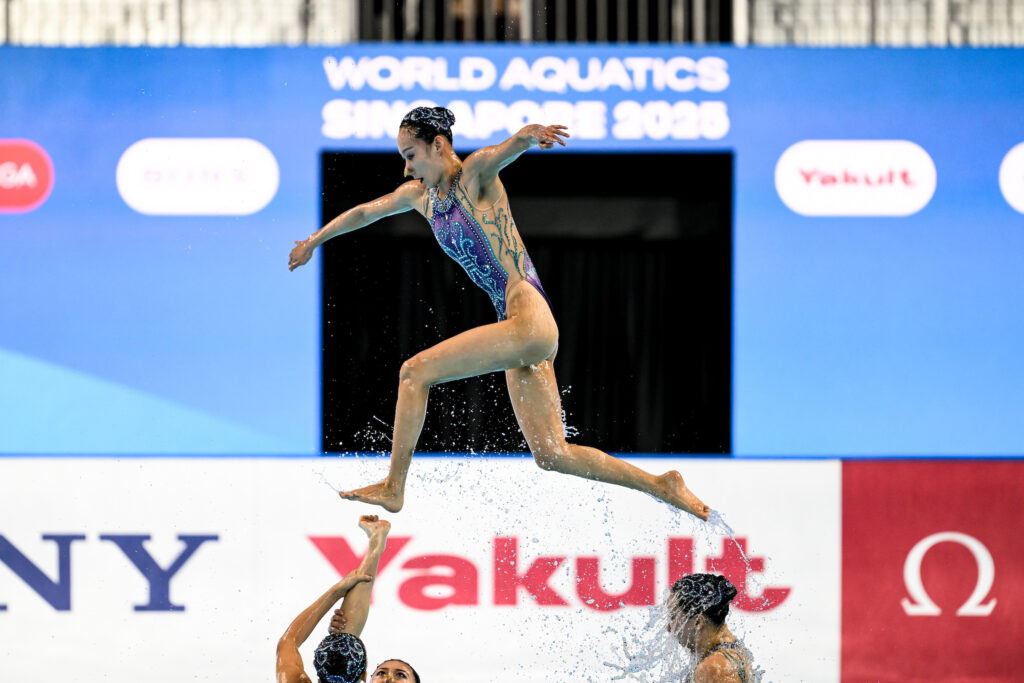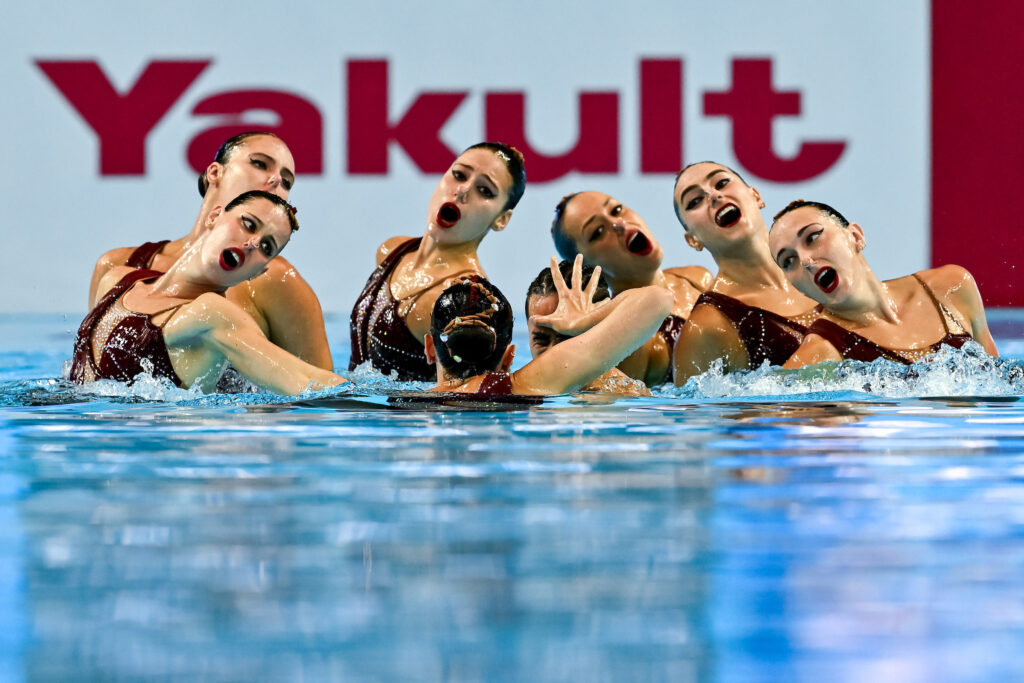The People’s Republic of China captured its second gold medal of the 2025 World Championships on Sunday, delivering a commanding performance in the free team final to extend its global dominance in the event.
The third day of artistic swimming competition in Singapore featured two events: the women’s free solo preliminaries in the morning, and the free team final in the afternoon, where the reigning Olympic and World champions once again proved untouchable indeed.
FREE TEAM FINAL
The top 12 teams from yesterday’s preliminary round returned to the pool to compete for the first team medals of these championships. The final offered a diverse and well-rounded field, with four Pan American nations, four European countries, and four Asian teams represented.
The team of the People’s Republic of China claimed the gold medal and reaffirmed its absolute dominance in the event, winning a fourth consecutive world title in free team with a score of 348.4779.
The reigning Olympic Champions presented their “Gravitation” routine for the very last time and delivered an impeccable performance. Their declared Degree of Difficulty (DD) increased slightly from 69.15 in the preliminary to 69.9125 in the final, and their execution simply could not be matched today.
The squad was particularly relieved after this gold, which came despite significant last-minute changes. Indeed, captain and Olympic Champion Feng Yu had to step into the routine just three days before the team’s departure for Singapore, replacing Zhang Yayi, who injured her leg on July 9.
“Our captain has been through a rollercoaster competition,” head coach Zhang Xiaohuan said. “She had to remember the routine in a day, and step on stage within days. I felt so moved looking at her before the competition. Even while other girls were resting, she would spend the time visualising the routine. She’s never let us in on how anxious she must have felt, or how much pressure she felt. But we believe in our captain, we believe that she’s the one who can withstand pressure the best in this squad, and she lived up to it.”
For Feng Yu, the lead-up to this gold medal was clearly unlike any other. While the last-minute situation was far from ideal, the 25-year-old approached it with composure and maturity, determined to deliver not only for herself but for the team that had placed its trust in her.
“I think I didn’t sleep much the night before the preliminary,” she said. “But it was still ok, it didn’t affect me, in fact I felt even clearer in my mind. This has been a special one. You can’t say it was an ordeal, but it’s true that whenever I had a spare minute, I’d be thinking about this routine. It felt a little different from the excitement I usually feel about a competition. I wanted to take on this event with a bit more stability, and I didn’t want my teammates to feel the anxiety or pressure I had, and be affected themselves. I do feel like a little bit of a different person after this. It’s been a great challenge, just a different kind.”
The team had also changed all three acrobatic elements in the routine for these World Championships. “Risks co-exist with opportunity,” Zhang Xiaohuan said. “If I didn’t make these three changes, perhaps we would not be standing on top of the podium tonight.”
The risk did pay off, as the team earned four 10.0s on their acrobatic moves, including three on the first one, as well as three more 10.0s in artistic impression.
Japan secured the silver medal with a score of 334.7232, maintaining its position from the past two World Championships. Now under the leadership of new head coach Miyakawa Miya, the Japanese performed their “Bushido” routine, inspired by the Samurai moral code. This silver is surely a very exciting and encouraging result for the team, which left the Paris Games likely disappointed after placing fifth.
“Today we did our best performance so I’m satisfied,” Sato Tomoka said. “Our team made big changes from the Olympics to the World Championships. After Paris, five new people joined, so our team feels so fresh. Before (the) Olympics, we felt so much pressure from Japan because artistic swimming is a sport we are strong in and most people thought we could get more medals. That was a lot of pressure because we knew our standing. With this new team and new members, our mindset changed too, and that brought us back to second place.”
In Singapore, the Japanese executed their routine was executed with clarity and strength, with crisp movement and powerful energy sustained throughout. They also earned two 10.0s by the Elements judges on their opening acrobatic.
Japan had been ranked third in the preliminaries but moved up to second place in the final, after slightly raising its DD from 69.95 to 70.00 in the final and capitalising on an error from Spain.
Spain took the bronze medal with their “La Locura”, or “Insanity”, routine, which had the highest DD of the final at 70.245. The reigning European champions and Olympic bronze medalists were strong contenders for a podium finish coming into Singapore, and delivered an intensely engaging performance, featuring unique and risky acrobatics, to score 321.1328.
However, the team received a basemark on Element 8, likely after a mishap during a connection. It’s hard to be certain as to the exact nature of the basemark, as this hybrid (like too many others) was mostly filmed from an overhead angle – unfortunately still a director’s favorite pick for artistic swimming broadcasts despite the fact that the routines are designed to be seen from the side.
Regardless of the setback and the costly basemark, this third place is a huge testament to the overall talent of the team, the quality of the choreography and the strength of execution which still allowed Spain to remain on the podium.
The Spaniards also earned a handful of 10.0s: two on their opening platform acrobatic and two in artistic impression. This also marks a third medal across three events so far for the Spanish delegation, further confirming their consistency at the highest level.
“We made a little bit of a mistake and it’s not good for us,” Dennis Gonzalez said. “But I’m happy because we are still on the podium with this little mistake. I enjoyed this choreography a lot today, more than yesterday [in the preliminary]. The performance was incredible.”
“We were a little bit nervous because it was the final of the World Championships,” Cristina Arambula said. “But we did a great job and we enjoyed the performance today. Our sport is about perfection, so always, you can do better. This is a step towards moving forward.”
The team of the United States, Olympic silver medalist, finished fourth with its “Body” choreography, a reversal of the standings from Doha, where the nation had earned bronze ahead of Spain. The Americans had increased their DD in the final from 68.225 to 69.950 and presented a strong routine to score 318.0808, though it was not quite enough to return to the podium.
The presence of four mixed-gender teams in the final — Chile, Greece, Mexico, and Spain — was also noteworthy. Mexico in particular was a pleasant surprise, as Diego Villalobos joined the final lineup after not swimming in the preliminary round yesterday.
Most of the teams in tonight’s final now face a very quick turnaround, as they go again tomorrow morning in the technical team preliminary event.
WOMEN’S FREE SOLO PRELIMINARY
30 athletes competed in the women’s free solo preliminary round during the morning session. Xu Huiyan of China, who had already secured the technical solo world title the previous day, currently leads the standings with a score of 238.7737 for her “Eternal Night Sky” routine.
Vasilina Khandoshka, competing as a Neutral Individual Athlete and world bronze medalist in this event in 2024, is ranked second with a score of 238.2762. She is less than half a point behind Xu, setting the stage for a very close final. Khandoshka performed her highly original routine set to a “Mummy” theme, which stood out immediately for its dramatic atmosphere and mesmerizing movements.
In third place is Spain’s Iris Tio with a score of 235.3063. Swimming to Celine Dion’s “Hymne à l’Amour,” she delivered a sensitive and expressive performance, appearing more at ease with this solo than in previous outings during the season. The performance was well received and keeps her within striking distance of the gold, only 3.4674 points behind Xu.
European Champion Klara Bleyer of Germany is currently ranked fourth with a score of 229.9099. She had the highest DD of the event at 56.600, a substantial increase from her most recent outing at the World Cup Super Final, where she was at 53.750.
Just less than a tenth behind in fifth is Austria’s Vasiliki Alexandri, who scored 229.8163. Alexandri debuted a new routine inspired by the television series Squid Game, and the choreography was intricate and distinctive, with strong transitions and complex hybrids. Like Khandoshka, she demonstrated a clear commitment to thinking outside of the box and trying something very different.
The 12 soloists qualified to the final are Xu Huiyan (China), Vasilina Khandoshka (NAA), Iris Tio (Spain), Klara Bleyer (Germany), Vasiliki Alexandri (Austria), Enrica Piccoli (Italy), Audrey Lamothe (Canada), Marloes Steenbeek (Netherlands), Jasmine Verbena (San Marino), Zoi Karangelou (Greece), Maria Alavidze (Georgia) and Kyra Hoevertsz (Aruba).
The women’s free solo final is scheduled for Tuesday, July 22 at 10:00 am local.
ARTICLE BY CHRISTINA MARMET
Cover photo: Andrea Masini / Deepbluemedia
If you’ve enjoyed our coverage, please consider donating to Inside Synchro! Any amount helps us run the site and travel costs to cover meets during the season.



